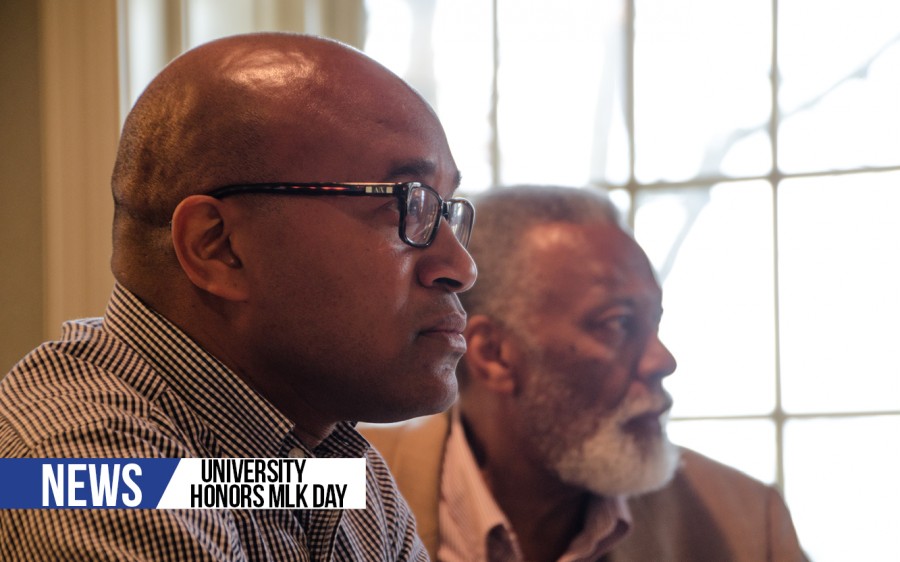“I Can’t Breathe” panel features diverse faculty perspectives
January 22, 2015
On a day that celebrates the most beloved civil rights activist of our time, Martin Luther King, Jr. Day, a diverse group of faculty speakers encouraged a packed audience of students to reflect on their notions of race and racism.
The five professors, moderated by Associate Provost for Diversity Bridget Newell, met in the ELC Forum to discuss racial inequity in the United States in a panel discussion titled “I Can’t Breathe: The Continuing Struggle for Racial Justice.”
The first speaker of “I Can’t Breathe” was Carmen Henne-Ochoa, a visiting assistant professor of sociology and anthropology and Latin American studies, who discussed the nation’s history and continuance of structural and institutional racism. Henne-Ochoa argued that though we live in a post-racial world and function under post-racial practices, we are still seeing deeply racialized outcomes.
“Racism has taken on a different form, a form that I believe is more insidious. And why is it more insidious? Because it is a kind of racism that is simultaneously unmarked but all too normalized,” Henne-Ochoa said.
Nina Banks, an associate professor of economics, followed up Henne-Ochoa with a discussion of racial wealth disparities present in American society and their relation to her own views of the history of structural racism. According to Banks, wealth is the primary area of racial inequality in the United States, and this wealth gap is being passed down from one generation of Americans to the next.
“The average white and black family does not start out on a level playing field, and the effects of that unequal playing field continue to affect opportunities over a lifetime for [these families],” Banks said.
Rather than continuing to highlight the flaws existent in this post-racial society, speaker Atiya Stokes-Brown, associate professor of political science and assistant dean of arts and sciences, argued that we do not live in a post-racial society at all. Stokes-Brown supported her position with data that proved an increase in racial prejudice since 2008.
She noted that although many people believe that racial equality had been achieved with the election of President Barack Obama that year, he had won only 43 percent of the white votes, and since then the number of white people voting has decreased.
“The bottom line is that America, as a post-racial society, is purely theoretical. We haven’t gotten beyond race. Race is more important than ever,” Stokes-Brown said.
David Ragland, a visiting assistant professor of education, addressed the question “Why Ferguson?” Ragland urged his listeners not to disconnect the events of Ferguson from the rest of the country. He called the abandonment of Michael Brown’s body on the ground for nearly four hours “the ultimate sign of disrespect,” asking the audience what they expected to happen in response.
“Ferguson was bound to happen. Seeds were planted. The ground was fertile. It rained a little bit. The sun had shone itself. And the foghorns of discontent, frustration, and resentment emerged, and is unstoppable and spreading,” Ragland said.
The last speaker of the panel, Professor of Economics Marcellus Andrews, agreed with Ragland that what occurred in Ferguson, Mo. and its backlash were “inevitable.”
Andrews surprised the audience when he asked them to acknowledge Martin Luther King, Jr.’s failure. Andrews recognized that the Civil Rights Act was pivotal in evolving racial attitudes, but pointed out its inability to persuade all to take the egalitarian path.
“You will have equal opportunity, or you will have this. You have equality, or you have war,” Andrews said.
This was the last of three panels held throughout Martin Luther King, Jr. Day; it followed one titled “The Illusion of Race and its Lived Realities,” which was led by Professor of Sociology Linden Lewis and Assistant Professor of Spanish Hiram Smith. The other panel was called “Labor Market Discrimination and Educational Disparities in the Post-Civil Rights Era,” led by Assistant Professor of Education Richard Henne-Ochoa and Rhonda Sharpe, visiting associate professor of economics.





















